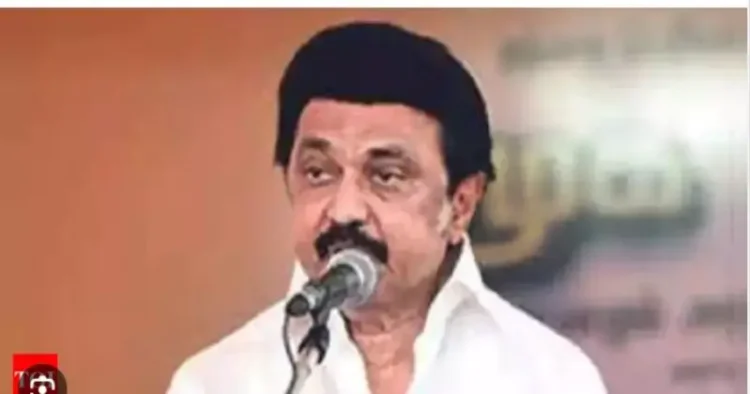The Dravida Munnetra Kazhagam (DMK) has launched fresh allegations against the Bharatiya Janata Party (BJP), accusing them of orchestrating parallel governments through appointed Governors. DMK leader and Chief Minister of Tamil Nadu MK Stalin reiterated these claims during his speech at the Manorama Conclave 2022, addressing the theme “The State of Affairs: Federalism, Freedom, and Forward.”
Stalin expressed concern over what he described as the BJP’s “authoritarian tendency” to govern through appointed governors, undermining elected administrations. He emphasised the need for states to resist such challenges to their authority and cautioned against providing space to what he termed as “wicked forces.” Stalin argued that this approach not only goes against the interests of states but is also a violation of the Constitution of India.
Some strong words by MK Stalin:
Accusing the BJP of running parallel governments through its Governors, said Chief Minister M. K. Stalin
“India is not just land, but it is made of its people. India is not a single government, but a union of governments. Union is not a wrong word.— @Reasonyourself (@Reasonyourself) July 30, 2022
The DMK leader’s remarks at the conclave mirrored a statement he made in July 2022, indicating a consistent stand on the issue. Furthermore, Stalin used the same rhetoric in a letter addressed to party workers on January 18, characterising the governors appointed by the BJP as “not at all worthy” of their responsibilities. He criticised the centralisation of power, asserting that ten years of BJP rule had eroded the rights of states, particularly in areas such as education, language, finance, and legal matters.
Stalin’s strongly-worded letter accused the BJP of perpetuating political lows and emphasised the adverse impact on states. He highlighted the encroachment on states’ rights by the Centre, citing instances of infringement on education, linguistic rights, and financial autonomy. The letter also underscored alleged atrocities against domestic values during the BJP’s rule.
Stalin accused those in high positions in the Union government of communalising politics, politicising spiritual feelings, and inciting communal hatred. He alleged that Hindi and Sanskrit were being forcefully implemented with the intention of destroying Tamil and other languages and their traditions. However, this accusation has been refuted, with critics highlighting that the Union Government has not imposed Hindi or Sanskrit on the people.
The DMK leader expressed concern over the alleged saffronization of Tamil savant Thiruvalluvar and accused the BJP leaders of promoting outrageous politics, particularly inciting religious hatred. Stalin emphasised that his party had the strength to democratically counter such politics.
Stalin called for urgency in every state to unite against the BJP, and he announced the forthcoming DMK youth wing conference in Salem on January 21. While some political observers speculate that the event aims to promote Stalin’s son and may pass resolutions to make him the deputy CM, Stalin asserted that the conference was essential for realising the need to fight against the alleged injustices.
The Salem conference, according to Stalin, would serve as a platform to discuss and promote the rights of states, coinciding with the I.N.D.I.A bloc’s efforts to address challenges faced under BJP rule. He described the event as historic and not just a gathering but a conference that would prioritise the rights of states.
Recalling his days as the youth wing president, Stalin highlighted the DMK’s efforts to celebrate Pongal as an egalitarian festival, with the participation of members of other faiths. Critics questioned the selective approach, asking if the DMK would extend the same approach to celebrating festivals from other religions, rather than focusing solely on Hindu festivals. They expressed concerns about diluting the significance of Hindu festivals and accused the party of appeasing minorities at the expense of Hindu customs and traditions.
In April 2022, Tamil Nadu Chief Minister M.K. Stalin and his Kerala counterpart Pinarayi Vijayan launched a joint attack on the BJP-led NDA government during a seminar organised by the CPI(M). The leaders alleged that the central government, led by the BJP, was undermining Constitutional values and attacking the basic principles of federalism.
During the seminar, Vijayan emphasised the significance of unity in diversity in India and noted that the Constitution acknowledges and values the country’s linguistic diversity. He criticised the Sangh Parivar’s agenda, claiming it disregarded diversity and federalism. According to Vijayan, the Sangh Parivar’s agenda sought to weaken regional languages, contrary to the principles that led to the formation of states based on language after prolonged struggles.
Stalin echoed Vijayan’s sentiments, accusing the central government of attacking the foundational principles of federalism. Both leaders highlighted the importance of recognising and preserving linguistic diversity in the country.
The statements made by Stalin and Vijayan align with a broader trend observed among non-BJP ruled leaders, particularly within the I.N.D.I.Alliance. This trend involves accusing the central government, led by the BJP, of eroding federalism and diversity. Critics argue that such statements may be a strategic move to confuse voters, diverting attention from instances in the past when elected state governments were dismissed and emergencies were declared under the Congress and UPA regimes, in which these parties were partners. The reference to the BJP’s alleged attacks on linguistic diversity and federal principles serves as a rallying point for the opposition, framing the narrative ahead of crucial elections.
As political leaders exchange accusations, the debate around federalism and diversity remains a key aspect of the political discourse, shaping public opinion and influencing electoral outcomes. The statements from leaders within the I.N.D.I.Alliance underscore the evolving dynamics in Indian politics, with federalism emerging as a focal point in the ongoing political narrative.
The DMK leader’s consistent stance against what he perceives as an authoritarian approach by the BJP reflects growing tensions in the run-up to the Lok Sabha elections. Observers suggest that these accusations could be part of DMK’s strategy to counter BJP’s aggressive campaigning, especially considering the party’s recent electoral gains and achievements. The political landscape intensifies as both parties engage in a war of words, setting the stage for a challenging electoral battle.



















Comments